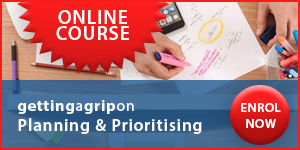Every month Robyn Pearce interviews an expert with world-class information to share with her GettingAGrip Inner Circle members. If you’re interested to know more, check out www.gettingagrip.com/membership. You’re welcome to trial a subscription for only $1 for the first month and can cancel at any time. Members can download all past interviews in audio, the monthly members’ newsletter and a number of other exclusive resources. Silver members receive the interview on CD.
The complete interview with Steuart is available for audio download. This is a summary of the key points.
About Steuart
Steuart Snooks is a productivity expert from Melbourne, Australia. He has a major focus on helping people with the very common problem of email overload.
His first career was in the wine industry. He worked in restaurants, retail and wholesale before travelling to France to pick grapes. Driven by a fascination of combining wine, travel and education he joined a time management company with a view to becoming a time management expert to the wine trade.
Over the last 14 ½ years Steuart’s career has evolved from a position of time management consultant to dealing specifically with the email-related issues of time management and productivity. He has now spent the last 6 ½ years focusing on best practices in managing email overload.
Robyn’s questions and comments are in bold-italic.
What has been the most interesting finding of your research into best practices?
Most of the good time management principles and strategies are nearly the opposite of human nature. They don’t necessarily come to us easily, logically or intuitively. They have to be worked on and require people to be strong-willed and disciplined.
Can you tell us about the Special Report you have written – ‘The 8 Critical Impacts of Information and Email Overload’?
Since I started researching best practices, I haven’t stopped. I summarised those best practices and trends into the 8 critical areas identified in the report.
The first of those is the interruption and distraction factor. One of the key reasons information overload has such a strong negative impact is because it often arrives as an interruption, especially now that there are a wide range of technologies that deliver this information anywhere at almost any time. These days we’re connected almost 24/7. It’s not the problem with the email content; it’s when it arrives that is doing the damage.
What kind of places did you access for your research, and who else is doing it?
Google Alerts are great. I typed in terms such as “information overload,” “email overload” and “email management.” I looked at a wide range of research and found some complex studies that have been done in the States.
- The computer company Intel have been researching in this area since 1995 and have some really good research data.
- Nathan Zeldes who originally drove the research is now out on his own and specialising in consulting around information overload and how to use technology to manage it.
- The University of Oklahoma has done some good work on this too.
- New York-based Basex is a research company who specialise in information overload.
- And then there’s the Information Overload Research Group- a non-profit interest group dedicated to raising awareness, sharing research results and promoting the solutions around information overload. Companies such as Microsoft and Google are members. The ones who actually caused the problem, generating enormous amounts of information, are now contributing to solutions.
You talk about 8 ways we are impacted by information overload. What are the top few?
At the top of the list is the interruption factor. I work with this on a daily basis. Research shows that most knowledge workers lose about 28%, or 2.1 hours a day to constant interruptions.
The part we often underestimate is the recovery time. The interruption itself might only be very brief but it can take an extraordinary amount of time to get back to the train of thought we had before the interruption occurred. This accumulates quite alarmingly over the period of a day.
The information that comes in is often very relevant but it’s the timing of its arrival that causes the damage. There are things that I need to know about and you need to know about, but if we’re already working on a higher priority task when it arrives, it has a strong negative impact.
What is your opinion on open plan environments? Do they exacerbate things?
Open plan environments definitely have an impact because not only is it your own interruptions that affect you, but everyone else’s as well. Their dings, noises and phone calls are a mental distraction and an interruption to you even though not meant for you.
It’s very difficult to control interruptions in an open plan environment, but using headphones is one thing that can help. If you have the flexibility of working on a laptop it can help enormously to just get yourself out of that environment altogether. Try relocating to an office or meeting room. Even going to a café or a park bench with your laptop can increase your productivity. Not only do you get away from the sources of interruption but you also get yourself into a different mental space and somehow you find some new inspiration or creativity that you might never get in a normal office. The flexibility and portability that we have now with our technology allows us that sort of freedom.
It’s an interesting contradiction that technology gives us freedom, but can also tie us down if we don’t take control of it.
Absolutely. We must be careful that our technology doesn’t drive our behaviour and that we actually have behaviour that is right for the technology. Then we make sure we’re the master and it stays as the slave.
In your report you quote Paul Chin in his online journal ‘Dealing with Information Overload’ as saying, “Rampant multi-tasking and the deluge of available information has produced a counterproductive culture and created a paradox. The more we try to do, the less we get done. And the more inundated we are with information the less time we spend absorbing it.” Please share your views on multi-tasking.
Once we are interrupted while doing a task we then try to achieve two tasks and sometimes three or four. We may have multiple screens open and maybe multiple files open on the desk. The problem is, multi-tasking can give us the illusion that we’re actually productive and smart. The reality is we can only truly focus on one thing at a time.
So multi-tasking forces us to do the extra processes due to what is called “contact switching.” To give you an idea of this, when we’re working on the computer and have a range of programs open like Excel, Word and PowerPoint and Outlook and we want to change between programs we just click on the icon and it’s up to speed and away we go.
But our brains don’t work like that. When we want to change our thinking the analogy would be that if I wanted to change from Word to Excel, I’ve actually got to double click the Excel icon and get the program to start up. And it takes time while you wait for that to get up to speed. It is the same with us mentally; it takes time when we switch tasks to get up to speed on the new task.
This happens very quickly, of course, but when we do lots of it we lose this contact switching time. And it’s surprising how that does add up over a period of a day.
The interruption that caused the multi-tasking often has a number of negative impacts. It’s harder to stay focused and harder to think deeply. We skip across the surface with so many different pieces of information and so many different tasks but achieve no great depth in any one.
There are concerns that future generations will lose the capacity to think deeply, therefore they will struggle to come up with creative solutions and problem-solve at a deep level.
Two Harvard psychology professors actually coined a term, called Pseudo ADD, for becoming addicted or acquainted with the bombardment of information. They noticed the increase in people experiencing short attention span because of advances in communications. This has a sustained negative neurological effect as well. They stated that it isn’t an illness but purely a response to the hyper-kinetic environment in which we live.
When a manager is desperately trying to deal with more input than he can possibly handle, the brain and body get locked into a circle where the brain’s frontal lobes lose their sophistication. We get black and white thinking and start to lose the perspective and shades of gray. People with this sort of difficulty struggle to stay organised, to set priorities and to manage their time. They have this constant low level feeling of panic and guilt.
Overcoming this starts with awareness of the impact such a state is having. And once we are aware we can begin to look at alternatives and solutions.
You might like to check out Maggie Jackson, who has done quite a bit of research in this. She wrote a book called, Distracted, The Erosion of Attention in the Coming Dark Age.
So what is the next most important way we are being overloaded?
Busyness leads to a lack of thinking time. More and more CEOs and business people say they lack time for the longer term strategic thinking that is needed to really move the organisation forward. It has been squeezed out by the busyness of the modern workplace.
So much business comes from email and information overload and a lot of it arrives as an interruption. It is key that people carve out at least a small section on a regular basis where they get out of the environment where that’s happening and allow themselves some think time.
One of my sons is a Lt. Colonel [2012 update – now a Colonel] in the New Zealand Army. He found, when based at Defence Headquarters a few years ago and working on a very high level project, that he couldn’t do the thinking required for that project whilst sitting at his desk. That location was ok for day to day things but when he wanted to work on concepts and bigger planning, he changed environments. He went to an empty classroom where he could work with white boards and flip charts. His comment was ‘Small space for small thinking; big space for big thinking.’
The creative thinking process requires long stretches of uninterrupted time. To process information, sort it mentally and  generate insights not only takes time but requires mental concentration. That concentration builds slowly and can easily be lost. Modern workplaces make it even harder to build it and so easy to lose it. That’s why I’m finding more and more value in recommending, where it’s an option, that people to get themselves out of that environment and into another environment.
generate insights not only takes time but requires mental concentration. That concentration builds slowly and can easily be lost. Modern workplaces make it even harder to build it and so easy to lose it. That’s why I’m finding more and more value in recommending, where it’s an option, that people to get themselves out of that environment and into another environment.
Mental health and well-being is another key issue in the workplace. One study from the UK showed that employees who work temporary or shorter hours report having better wellbeing, general health, a more positive attitude towards work and better work behaviour, i.e. less absenteeism, than those who work on a full time or permanent basis. That indicates to me that those who are subject to the constant barrage of information and interruptions suffer greater stress than those who are at work less often.
This barrage of information can lead to chronic distraction. David Meyer, Professor of Psychology at the University of Michigan is a leading expert on this. He specialises on how we focus on one thing rather than another. He is convinced that chronic long-term distraction is as dangerous as cigarette smoking to our health.
Working in such an environment can actually lower your IQ. Attention deficit syndrome starts to kick in and we start to have almost an ADD condition. In 2007 Dr Gwen Wilson at the University of London compared a group who worked in a distracted environment to one that didn’t. The distracted group’s IQ dropped by 10 points compared to the non-distracted group.
To put that into context she then compared it with research that’s been done around smoking marijuana. A lot of research over a long period of time indicates it’s not good for us; it kills brain cells and drops our IQ. The question is, how much? The fascinating thing is – it is only 4 points.
Wow! What then are some of the solutions to overcoming information overload?
First we must be aware of what it’s costing us to continue doing things the way we’re doing them. We need to realise that an incremental solution isn’t going to solve the issue. After we have that awareness there are 3 major keys. Tim Ferris who wrote the ‘4 Hour Work Week’ also wrote a white paper called ‘How to Eliminate Email Overload and Triple Your Productivity in 24 Hours’. The white paper talks about 3 things.
Reducing frequency is the first one. We have to eliminate email as an interruption. Getting email is fine but allowing it to come as an interruption is very costly. We should schedule times to check email rather than just allow it to come in at any old time and be reactive. If we’ve scheduled times then we can turn off the alerts and be ignorant of when they are arriving.
Then because that’s changed the way we normally respond to email, we need to manage other people’s expectations about how often and how quickly we’re going to respond to their emails. You can send a one-off email letting them know you changed your practice.
I recommend people add a PS to their signature that says ‘Hey I’m not always at my desk. I check my email 3 times a day and if you need me for something more urgently than that, please use another channel – for example, my mobile number or page me’.
The problem with email is we have urgent, non-urgent and not so urgent messages all coming through the same channel. Because we’re worried about missing something urgent, we then become available to be interrupted by the vast majority which aren’t urgent at all.
One of the key things organisations need to do is talk about what actually constitutes a true urgency and what channels should be used to communicate that.
Secondly, decrease the volume. This cuts to the heart of overload. Decreasing volume is vital and can be managed in 3 steps:
- Automate the process at the email level by using rules. I find the CC rule very good because it makes a nice, clean separation of email that requires my action or response from email that just needs me to read and be aware of.
- Have a folder structure so that information doesn’t get bottlenecked at the inbox level. Older versions of email software don’t have very strong search functions so you probably do need to have a fairly robust folder structure. But the current versions have comparable search and sort functionality and you can put everything in just one folder and use search and sort to find what you need.
- Get rid of attachments that clog up your email system. Either save them to your hard drive or delete them if they are not useful.
Thirdly, we need to increase the speed at which we process by using a great time management strategy. The 4 D methodology allows us to handle each email only once and move it on. There are only 1 of 4 things to do with an email:
- Ditch it or delete it.
- Delegate it to someone else for the next action.
- Do it then and there (if it can be done within 2 minutes or less).
- Decide. This is the hardest one and there are 3 possible decisions you can make:
- Hang onto it for future reference.
- When? If you can’t get it done in 2 minutes or less, when will you come back to it? Convert it into your calendar if possible.
- Wait. Sometimes you need to wait on someone else or something else to happen. So put the email into a waiting folder.
Once we are at this stage we should be looking at ways to get better responses as senders of email and increasing the speed of communication. This is most effectively done by using outcome focused subject lines that encourage one of four outcomes:
- Action Required. We want someone to take an action. They need to physically do something for you.
- Response Requested. You don’t want them to do something; you just want them to respond to you. Are you available for a meeting on Thursday? Did you read the report I sent you?
- Read Only. We want someone to read the email but that’s all they need to do. They don’t have to take action or respond but they do need to read it. For example: Robyn, will you please read this report before our meeting on Friday.
- FYI only. Here we’re saying: I found an article of interest but whether you read it or not is up to you.
How do you get started on all this? Turn off your email alerts. It may be the single biggest thing you do that turns off that flow of constant interruption. For further assistance and for my special report ‘The 8 Critical Impacts of Information and Email Overload’? go to my website www.EmailTiger.com.au
This is a summary of the interview between Robyn Pearce and Steuart Snooks on October 2011’s member-only Getting A Grip Inner Circle interview. If you would like to become a member of our Inner Circle or get copies of the CD, contact our office via our website www.GettingAGrip.com.








